MercoPress. South Atlantic News Agency
Antarctica
-
Thursday, March 19th 2009 - 16:40 UTC
Antarctic ice cap melting much faster than predicted
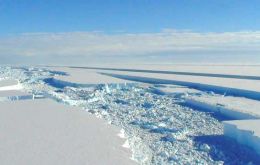
Two more scientific studies show a large part of the Antarctic ice cap melting at a much faster rate than previously predicted.
-
Saturday, March 7th 2009 - 07:27 UTC
Argentine/Chilean congressmen condemn UK’s Antarctic expansion claims
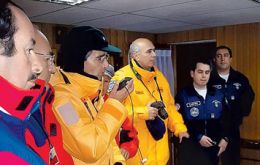
Congress members from Argentina and Chile signed a statement supporting the full enforcement of the Antarctic Treaty and reiterated their common position against the United Kingdom’s announced intention of extending claims over the continental shelf.
-
Thursday, February 26th 2009 - 23:00 UTC
Survey of massive mountain range below Antarctic ice

A massive yet enigmatic mountain range as big as the Alps lying deep beneath Antarctica's ice has been surveyed in detail for the first time. The expedition, one of the most ambitious and challenging during International Polar Year, has captured the first clear picture of the mysterious Gamburtsev sub-glacial mountains.
-
Wednesday, February 25th 2009 - 23:00 UTC
Success of Polar Year confirms worst climate change fears

Scientists and policymakers marked the official end of the International Polar Year (IPY) Wednesday at the World Meteorological Organization in Geneva. The 60-country, 1.2 billion US dollars effort has seen knowledge about the poles - and their influence on the rest of the planet - increase hugely.
-
Monday, February 23rd 2009 - 20:00 UTC
Argentina plans to boost its Antarctic operations

Argentina is expected to announce Monday a boost in resources and staff to its presence in Antarctica, according to reports in the Buenos Aires press. The event coincides with the 105th anniversary of Argentina's first landing in Antarctica and which in the local calendar is identified at the Argentina Antarctica Day.
-
Wednesday, February 18th 2009 - 20:00 UTC
Zero-emission, energy self sufficient Antarctic base
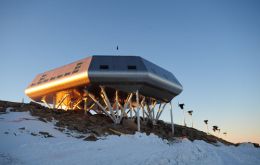
Belgium opened a new 20 million Euro “zero emissions” polar science station in Antarctica on Sunday, returning to the continent to study climate change 42 years after closing its first base there.
-
Wednesday, February 18th 2009 - 20:00 UTC
A Falklands area ice-block breaks off in Antarctica

A 14.000 square km ice block, almost the area of the Falkland Islands (12.173 sq. km.), has broken off Antarctica's Wilkins Ice Shelf and fragmented into smaller icebergs reported on Tuesday the Spanish National Research Council, CSIC.
-
Saturday, February 14th 2009 - 20:00 UTC
Record applicants for 38 jobs in BAS research stations
The British Antarctic Survey (BAS) has offered some 38 jobs in five of its research stations on the world's coldest continent, Antarctica. The BAS advertisement invites plumbers, carpenters, electricians and chefs to fill its vacant spots for a period of 4 to 18 months, MailOnline reported.
-
Wednesday, February 11th 2009 - 20:00 UTC
HMS Endurance in Portsmouth by end of March, say rescuers
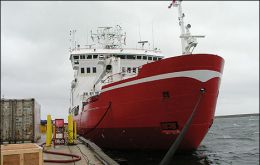
Logistics experts from Netherlands Dockwise's subsidiary Dockwise Shipping in Bermudas are working closely with the UK Ministry of Defence (MoD) to recover the Royal Navy ice patrol vessel HMS Endurance currently anchored in the Falkland Islands.
-
Thursday, January 29th 2009 - 20:00 UTC
China builds station on Antarctica's highest icecap
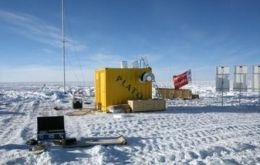
China set up this week its third Antarctic research station, also the country's first on the continent's inland. Kunlun station was erected at Dome Argus (Dome A), the South Pole's highest icecap at 4,093 metres above the sea level, reports the Beijing press.
